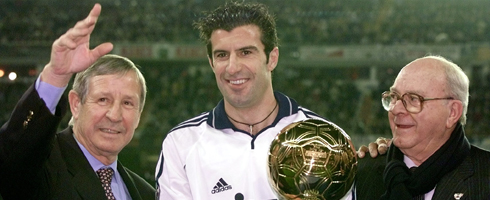In what was the greatest year of his career, 2000 saw the best of both sides of Luis Figo – the swashbuckling winger at Barcelona who became the midfield orchestrator for Real Madrid and Portugal. His Ballon d’Or award was a fitting tribute to a level of performance he sustained and made him, for one year at least, the most expensive player in the world.
The darling of the Cules since he was signed in 1995, Figo’s ever-improving displays in a Barcelona shirt culminated during 1999-00 when, for club and country, he scored 20 goals. Alongside Rivaldo, few teams were capable of living with the dual threat the pair posed on both flanks at Camp Nou. Reaching the peak of his powers, the 27-year-old gained prominence amongst British audiences with his dismantling of Chelsea in their rollercoaster Champions League quarter-final clash. At the end of the season, Figo’s stock was never higher and eminent critic Johan Cruyff eulogised: “he can do everything: can cross, can cut inside, can shoot with his right or left. Yes, he really has everything.”
With the golden generation maturing into one of the favourites for Euro 2000, and Figo having established himself alongside Ronaldo, Rivaldo and Zinedine Zidane as part of the footballing elite, the stage was set for Portugal to dominate the tournament. Yet, it almost fell apart within 20 minutes of their opening fixture after Paul Scholes and Steve McManaman had put England two goals to the good. In a heavyweight group with Romania and Germany still to come, it looked like the dream was over before it had even begun.
Figo changed that. Picking up the ball in the middle of the park, he strode forward and unleashed a 35-yard cannon into the top corner. Excitement may have been tempered as replays showed the strike deflected off Tony Adams ankle, but it was a symbolic moment and one which captured the panache and powers of the Portuguese. Prompted by Figo and Manuel Rui Costa, Portugal quickly regained control and their 3-2 victory ultimately flattened Kevin Keegan’s England.
The following game against Romania was petering out into a goalless draw when Figo’s flighted cross set up Costinha for an injury-time winner. That was enough to ensure Coach Humberto Coelho could field his reserves in a routine 3-0 victory over beleaguered Germany in the final match. Into the knockout stages, the winger was again instrumental in the quarter-final against Turkey where he set up both goals for Nuno Gomes.
In the semi-finals on a balmy evening in Brussels, a classic ensued between France and Portugal as Zidane, Rui Costa and Figo jockeyed for control of a gripping match that was ultimately decided by the Juventus player’s golden goal penalty. Although Portugal were edged out at the death, Figo left Euro 2000 with his reputation bolstered and was an unequivocal selection for UEFA’s team of the tournament.
Behind the scenes meanwhile, Figo was the pawn in a presidential battle between then Real Madrid incumbent Lorenzo Sanz and candidate Florentino Perez. As part of his campaign, the latter made the promise – that few believed – that he would bring Figo from arch-rivals Barcelona should he be elected. Perez made good on his word and a world-record €60m transfer was arranged in July.
It was one that former Barcelona player Ronald Koeman described as ‘an historic error’, as the contrasting fortunes of both clubs over the next few seasons soon proved. As Barcelona dropped off the pace and struggled to even qualify for the Champions League, Real Madrid enjoyed domestic and continental success.
Figo also made the transition from out-and-out winger to an inside-forward role, becoming more involved in dictating play for Madrid. In a replay of May’s Champions League Final, he made an instant impression by netting a late winner against Valencia on the opening day of the Primera season. For all the euphoria surrounding Perez and his emerging Galactico era, the competitive nature of Spanish football ensured it was not an entirely easy ride for the Portuguese star. His Madrid side returned to Barcelona in October where the fired-up Blaugrana were deserved 2-0 winners, much to the vengeful delight of the Catalan faithful.
That was a mere blip during a campaign in which Figo had no peers in Europe. During the week he received his Ballon d’Or award, he was back in Barcelona, but this time at the Estadi Olympic against Espanyol, where a typical free-kick winner was a fitting end to the greatest year of his career.

